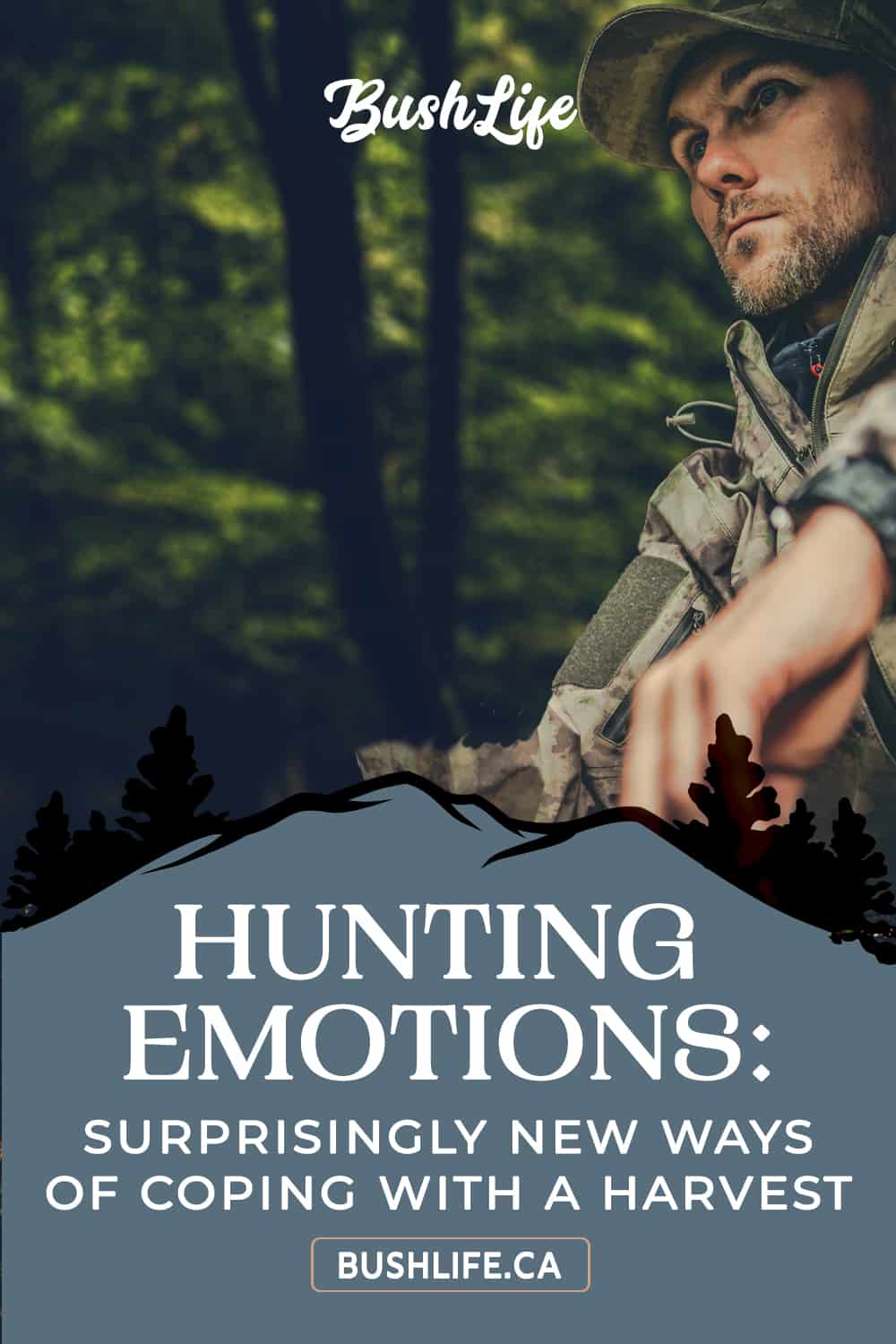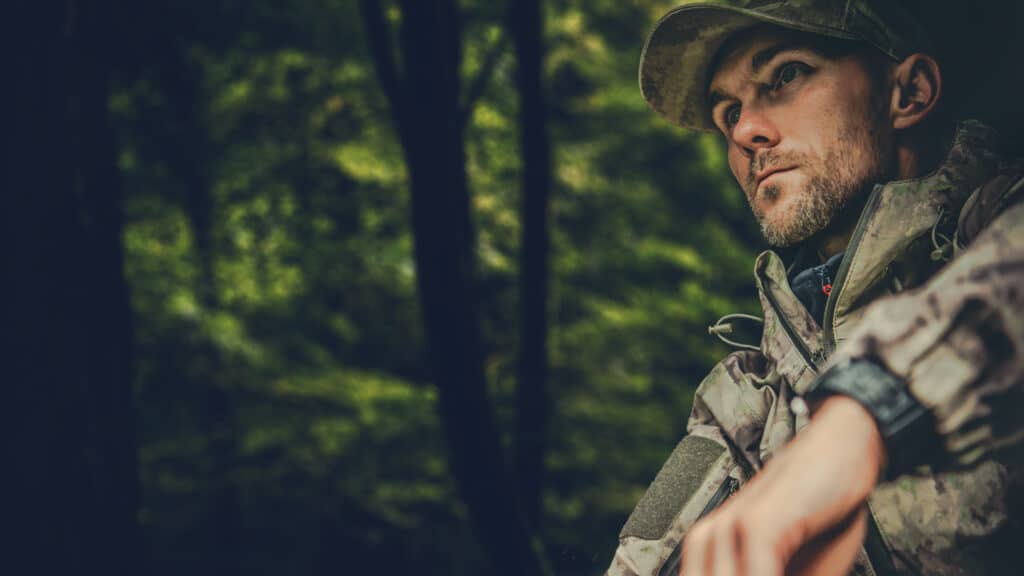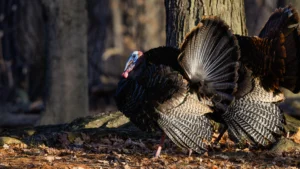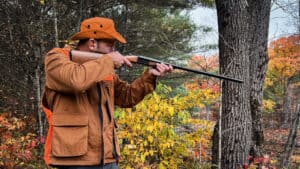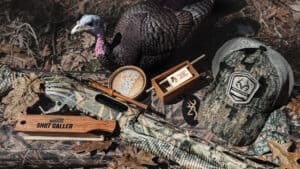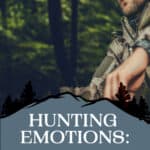It’s a foggy morning, and your hunting decoys are out, but there are no birds. An hour goes by, and ultimately, a flock of geese hear your call. As they honk and turn to come and land, your heart is pounding – it’s a moment you will NEVER forget. They’re in range, you pull the trigger, and next thing you know, you harvested some birds. You’re on top of the world. And in a drop of a hat, hunting emotions click in, and you may regret what you just did. Wishing you could take it all back.
Discloure: Posts may contain affiliate links. Purchases made through our links result in a small commission to us at no charge to you. We only recommend products that meet our brand standards based on testing and first hand use by our authors.
Hunting Emotions and the New Hunter
If the above sounds like you and it’s your first time, you’re a genuine hunter now. But congratulations are in order for two reasons, as you just appointed yourself a newly minted butcher. Whether you like it or not. The law is clear about not leaving your harvest behind and letting it go to waste.
Now, there are two hunting emotions you need to overcome: 1. You just killed something, and 2. You have to clean it! Some people struggle with one or the other, or even both. And for some, this doesn’t go away even 30 years later. I’m here to help.
In ‘A Guided Duck Hunt,’ I briefly touched on my first time hunting. It’s time to expand a bit. Becoming a hunter has nothing to do with pulling a trigger!
Hunting Actually STARTS Like this:
- A day of class and exams for your gun license
- Another full day of hunter training to get your credentials and pass another exam
- Go IN PERSON to a MAIN service Ontario office to get your hunting credentials added to your outdoors card
- Buy your license and tags
- Wait for your certified gun exam results in the mail
- Get your photo taken, get people to vouch for you and mail it in with payment to the RCMP
- Wait eight months (at least I had to) to get your license in the mail
- Don’t get a record! Your record is checked nationally every SINGLE day by the RCMP across EVERY police department!
- Now you get your gun(s), ammo and gear
- Book your hunt
- and so on
Obtaining a hunting license and firearms is a serious and lengthy process. It’s also why hunting is a remarkably safe sport. My point is that when you finally get to go out and hunt, better yet, harvest, it becomes a glorious day! Other than the day your kid was born, it might be the best day ever!!!
In Comes the Hunting Emotions
If you are remotely like me and feel wrong that you just popped Daffy Duck and his friends, you will have to work on your hunting emotions if you intend to KEEP hunting. Especially after all the effort you just put in above.
What settles me down almost immediately is the thought that I intend to eat what I shot – otherwise, I would have NEVER shot it in the first place! In other words, I took a life to preserve mine – and to the non-hunter or even anti-hunters out there, keep reading as I have a big surprise for you and will elaborate.
Further Reading: A Guided Duck Hunt: The Easy Way to Learn Hunting
The Food Chain
You, me, the birds, the deer, and the apple trees are all part of a big food chain where one living thing consumes another. Here’s a simple fact you already know – if you don’t eat, you die. Here’s another fact – before there was farming, we were nomads, and EVERYONE was a hunter! Otherwise, the human race would not exist today. I touched on some of these topics in Hunting – Removing the Myths.
What a hunter will often hear is people saying that they don’t like the “poor wild animals getting shot at” or that all we are doing is “killing” things. When I hear that kind of thing, my blood boils. Why? Because these comments are spoken out of absolute ignorance. Again, I’ll get to that.
My first thought here is, seriously? It’s the negativity of non-hunters that creates a stigma that’s supposed to make the hunter feel bad. It’s the root of all bad hunting emotions. Reality is the hunter is doing something perfectly natural and normal. It’s something our ancestors did for survival and something that’s programmed into our DNA – regardless of our modern mentality.
Think about this for a minute – if you took the most anti-hunter on earth who hasn’t eaten in a week and you drop them in the woods, they’ll bludgeon a turkey to death with their bare hands.
Even the most sophisticated human on earth is still just an animal! Particularly a primate. Instincts, especially when facing the will to survive, will change people in a heartbeat, and they are capable of far more than they realize.
A Backwards Way of Looking at Things
Things should be the other way around. I have one question for the non-hunter – where did you get your meat today? Just google “what percentage of the world is vegan,” and you’ll see the answer is 1%. Stop and think about that. It means 99 out of 100 non-hunters or anti-hunters eat meat themselves.
It is this very group of anti-hunters that criticize the hunter – without EVER giving a single thought to the fact that they killed many animals themselves! Thousands of them over their lifetime. The only difference is they used their credit card at the grocery store to kill. It’s no different than a hunter using a shotgun. It’s hypocritical, no matter how you look at it, and it’s the root cause of fear or doubt in the new hunter’s mind.
Hunting is no longer a societal “normal” because the majority of the population lives a spoiled generational lifestyle with luxuries that didn’t exist in the past. If you think that’s far-fetched, it’s not. Consider this – if you’re not hunting your food like our ancestors and you’re not farming it either, which was the next phase of evolution, then you are buying it!
You buy it because you CAN AFFORD it and have a better job than the farmer.
The Luxuries of Wealthy Nations
While the grocery store is an ordinary way of life for us, the reality is that it’s not a necessity. It’s technically a luxury. After all, said above, if you don’t believe me, look at starving African nations or even disaster-struck or war-torn regions that don’t have food. Perhaps you can stop taking that grocery store for granted the next time you walk in. It’s a way of life for wealthy nations, no matter how you look at it.
What the Hunter Needs to Remember to Curb Hunting Emotions
Firstly, remember that what you are doing is NOT WRONG. Just be respectful and harvest humanely and ethically. Then you have no reason to feel bad and incur these hunting emotions. It’s no different than fishing, which is enjoyed by millions of people who are technically DOING THE SAME THING as the hunter, yet the amount of scrutiny they receive is far less, if any.
The second thing to remember is that you have the decency, and let me stress decency, to harvest the animal yourself! The guy at the grocery store HAS NO IDEA how the animal they just bought was treated let alone killed. When someone buys food, all they care about is whether it’s fresh and what it costs. The health-conscious will wonder if it’s “healthy,” and they will look for additives.
The pattern here is always the same. ME, ME and ME! I would bet money on it, even though I’m not a gambling man, that 99% of the population either forgets or has no regard whatsoever for the fact that they are buying cuts of meat at a store from an animal that had to be killed. I’m guilty as well, but guess what? It takes a hunter to notice and think about these things.
Take Advice from a Chicken
Well, not literally, of course, I’m not crazy! Have you ever googled how chickens are “processed”? Don’t bother, I’ll tell you. They are hung upside down on a factory processing line, electrically shocked so they don’t feel things, and oddly, that’s somehow the humane part. A machine then slices their throat. Does any of this sound humane? I don’t know. But then again, is any mass culling humane?
What I do know is that the mass killing of chickens NEEDS to be done for people to eat. There would be mass panic and hysteria as quick as tomorrow morning if the shelves were low, let alone empty. The proof is when COVID initially arrived, the shelves were FULL, but people still panicked.
Getting back to chickens and whether it’s humane or not, it’s not honourable, nor does it come with an ounce of dignity. And if you still don’t believe me that chickens need to be mass-processed, consider this for a second: About 650 million chickens a year are consumed in Canada! It’s the number one source of meat.
$5.99 per Pound
The same people that right off hunters as jerks have reduced chickens down to $5.99 a lb. And they are outraged when it costs more and scream about feeding their family. When there’s a special on wings we run like mad so they don’t run out! We cook up a whole bunch and toss the rest once our bellies are full. I am guilty and admit it, and so are you.
Compare that to geese harvested in Canada by hunters, of course, and that equates to around 500,000 a year. Price or consumption does not drive the hunter. Instead, they are driven by nature, particularly their love of nature and being in it. They only take what they need and what they can eat. From experience, if there is a tiny morsel of hunted food in our house that we don’t use up, it drives me mad bonkers, and I feel awful about it. I not only took that life, I processed the meat myself with my bare hands.
Hunting Emotions on Processing
If a hunter can get over the fact that they took a life, they still have a nasty job to do. It’s time to clean a dead animal. Many moons ago, I worked in a Fortinos grocery store and befitting to this story, it happened to be in the meat department. I was 16 years old. Beautiful cuts of red meat floating around on hooks and conveyors with a big glass window for everyone to see. It sure conveys confidence in customers to see their meat is handled well. But nothing was gorey, nor do people see what it takes to get to that point!
Breasting vs Gutting
It’s time to compare again. I usually breast geese or duck, as do most people and discard the rest. It’s not too bad of a process, even during your first time. But the other day, I thought it was time to “man up” and gut the duck I harvested. Instead of taking the breasts, it was time to prep an entire duck for a roast.
So I began to pluck all the feathers, which takes forever. Then you have to make an incision in the bottom and reach in with your fingers to start pulling the guts: the heart, liver, gizzard and so on. It’s not pretty, nor does it smell good.
Nope, not yet – you need to snap the legs and wings and make incisions where the tendons get cut, allowing you to separate these parts while yanking the tendons out. Then you reach in from the other side and keep pulling innards until you have a clean bird. When all done, it looks EXACTLY like a mini version of the turkey we roasted not too long ago.
Further Reading: The Dos and Don’ts of Hunting Safety
This is Perfectly Normal
As gross as gutting sounds, there’s a point to all of this. It’s a perfectly normal process that happens to animals – at least to a couple of million chickens daily. So, the new hunters should remind themselves that this harvest is similar to what they already eat. It’s also something that someone else (Ie. the meat packer, the butcher and so on) has been doing for them their entire lives.
The only scary or gross part is that it’s a NEW process for the new hunter. You haven’t seen it because we are spoiled, no, I should say “wealthy” enough to not have to do it ourselves.
When my duck turned into a mini-turkey, my first thought was: ok, now that’s something I can eat as it looks familiar. My second thought was pride. I overcame those hunting emotions and prepared an animal without someone’s help. It’s super empowering because it’s a reminder that I am fully capable of taking care of my needs, and so are you.
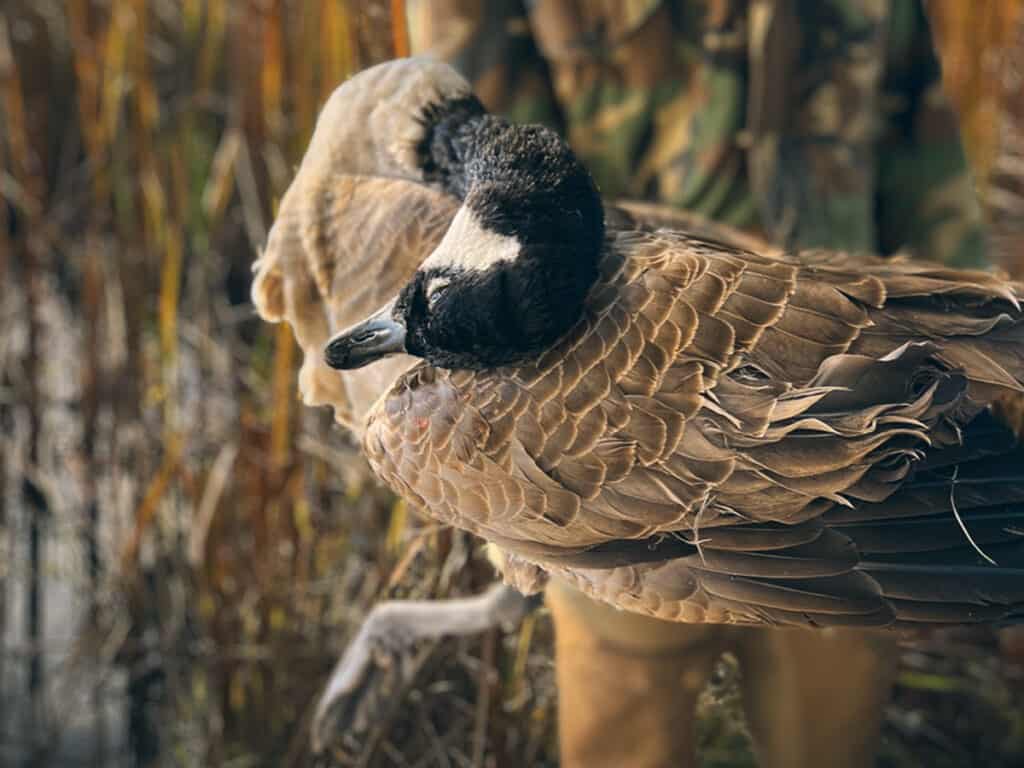
The Hunter Appreciates the Harvest
You woke up before the sun, and you ventured into the unknown. In the dark and cold, you set up and stood in icy water and used your skills and cunning to harvest your game. Then you cleaned it with your own hands and cooked it. When you sit around the dinner table with your family, you appreciate that meal far more than a person with a $10 grocery line item on the credit card statement.
Compare that to most people these days. People who struggle to find the time to cook a decent meal, let alone source natural ingredients from nature.
The fact that it bothers a hunter when they harvest means they’re human. And a good one because you appreciate the life you took by feeling bad for it. It happens to me with every shot, and I’m not ashamed to admit it. I’m proud of it. So, a certain level of hunting emotions over a harvest is customary. It’s how you appreciate the animal.
The Old Hunter Stuck with Hunting Emotions
There’s many a story of the old hunter at camp who grabs his gun daily and sits in his watch but never ends up shooting anything. Fine, sometimes there’s the odd gunshot, but they never haul a harvest as they always seem to “miss.” Those old emotions of hunting and enjoying being out are good enough for these hunters. They don’t want to harvest and would rather you not know.
Words of Wisdom From a Soldier
My grandfather, who was a soldier, like so many others who fought in multiple wars, would say that “a soldier is a trained killer – it’s their job.” He’s not wrong when you think about it, and that doesn’t make them a murderer. If led by decent leaders, a soldier only kills to protect the people of their nation. We just had Remembrance Day, and we paid the highest respects and honour to these very people who died in that process of protection.
My point here is that my grandfather, once a trained killer, only tried hunting once, specifically deer. He shot in the air to scare it off, never to try hunting again. Hunting is not for everyone, and some people can never conquer those hunting emotions no matter what they do. To those people, all I can say is I understand. And I can’t help you as it’s just not for you.
Hunters Help Ecosystems
While sticking with birds, the anti-hunters might panic because they read that 500,000 geese were harvested. The truth is the goose population is increasing. There is no threat or danger to geese imposed by hunters. If anything, they are keeping the goose population in check.
The MNR spends millions of dollars on research and wildlife research. When they establish hunting zones, dates, daily harvest limits, and possession limits – it’s all based on numbers meant to preserve and protect all wildlife for future generations.
The public needs to be educated that too many of a specific species can cause drastic problems in any ecosystem. That applies to the animals themselves, other animals or their natural environment. That includes everything from in-breading, disease and starvation.
Further Reading: Hunting – Removing the Myths: Let’s Get Some Facts Right!
Using Hunters as Control
The MNR uses hunters to keep in check wildlife populations (sub-sections of that ecosystem I keep talking about). For example, too many coyotes in an area with too few deer could eradicate the deer population. So, in this example, the hunter becomes the equalizer by increasing coyote limits and decreasing deer, exactly how the MNR wants it!
Speaking of deer, too many in a specific area will cause breeding issues, and feeding issues for that matter. In any natural environment, there is only so much food to go around and sustain a population. Deer, in particular, are at greater risk of starvation towards the end of winter, when most food has run its course and new growth hasn’t come in yet. If there are too many of them, they all are at risk of dying. The MNR knows this, and they allow hunters their numbers based on what’s best for the animals and not the desires of hunters, which is contrary to what many people may think.
Hunters Provide Information
Hunters provide vital information and participate in such things as mandatory hunter reporting. Whether they harvest or not, simply buying a tag requires them by law to report back to the MNR with information on the species they were permitted to hunt.
For example, bird bands on migratory game birds provide hoards of information for biologists, such as breeding and wintering distribution, behaviour, migratory routes, survival and reproduction. It’s been of fundamental assistance to them in understanding birds, and it’s been in use since 1950. For those who don’t know, retrieval of a bird band only happens when a hunter harvests a bird. The hunter then calls in the time and location of harvest along with the band information specific to that very bird.
Funding
Yes, money. Every year, millions of dollars are generated through the hunting industry, which goes back to wildlife preservation. Ducks Unlimited, for example, has preserved more wetlands and water than any other body. They preserved 201.8 million acres of habitat. Here’s the catch – Ducks Unlimited was started by a group of hunters, and to this day, hunters remain their most considerable contributors. If you enjoy the beautiful waters of a lake somewhere, Ducks Unlimited has something to do with it.
The same goes for the government. Hunting has generated hoards of money through licensing and tags, money, which has funded more re-investment into natural resources. For instance, the re-introduction of elk into Ontario was made possible thanks to a viable “financial” proposition to the government.
I read the other day that the combination of sport shooting and hunting contributes 8.5 billion dollars a year to the Canadian economy!
There is a very viable argument – let me rephrase this. 100% guarantee that hunting has genuine merit and a role in PRESERVING nature. It’s a great thing that’s unknown to the general population.
Hunters vs Poachers
Did you know that police and criminals have the same psych profile? Yet they fight profusely on opposite sides of the law. It’s no different when it comes to hunters vs poachers. Yet the poachers manage to add negativity to the hunter’s “emotional baggage” when it shouldn’t.
I cringe when I see ads from the MNR investigating an abandoned carcass or out-of-season harvest. A hunter would not do this, which the public needs to know. The hunter needs to remind themselves that anyone not of the preservation mindset was never a hunter in the first place – they are poachers. Often, the hunter discovers and/or reports the poacher, which should be a great source of pride rather than embarrassment.
Hunting Emotions
Society teaches, or better yet, let’s use the term programs us into thinking about what is “normal.” According to UN estimates, 2007 was the year that more people lived in urban vs rural settings for the first time globally. In other words, society = the city. We all know there’s no hunting in the suburbs.
The truth, however, is that it’s perfectly normal to harvest your food – your meat. It’s normal to clean it yourself – after all, someone has to do it. And it’s ok to KNOW where your food comes from!!! It’s not gross nor unsafe – it’s natural, and we have done it for almost 300,000 years. The caveman didn’t have food inspectors, yet we are still here.
Your New Normal is the Solution for Hunting Emotions
It’s far too easy to write off the protesters in front of meat plants as nothing but “activists.” The hunter who shoots the “poor” wildlife as “jerks” and everyone else that supports the industry, like guns, as “bad.” The decent person is the guy stuck in line at the grocery conglomerate, who unhappily contributes to their record profits by buying overly processed and inflated meat. That’s good, that’s ok, and that’s “normal”. Or is it???
Getting over hunting emotions is really about creating a new normal for yourself. Based on facts versus fiction. It’s also about understanding that most bad feelings you have are based on programming – the programming of a privileged modern life. If you can see the big picture, you’re are well on your way to a happy hunt.
Bookmark this post on Pinterest for future reference!
